By John Helmer, the longest continuously serving foreign correspondent in Russia, and the only western journalist to direct his own bureau independent of single national or commercial ties. Helmer has also been a professor of political science, and an advisor to government heads in Greece, the United States, and Asia. He is the first and only member of a US presidential administration (Jimmy Carter) to establish himself in Russia. Originally published at Dances with Bears
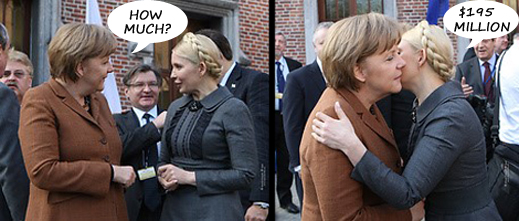
Two-front wars in Europe aren’t good for Germany.
Kaiser Wilhelm and Adolph Hitler don’t need to rise from their graves to make the point to the present German Chancellor, Angela Merkel. But is it her policy to pursue war against Russia in the east, and against Greece in the south, while claiming the conflicts have been forced on her by chekist Russians and chekist Greeks? The German characterization of both enemies as chekist comes from a high-level German figure who is close to the Chancellery and how Merkel thinks. In Berlin’s version of war in Europe, the new Nazis are in Moscow and Athens.
As for one of the leaders of the war party in Kiev, Merkel has privately and publicly endorsed every claim of Yulia Tymoshenko, promoting her release from prison and protecting her campaigns for war against Russia, even though – according to the high-level German source – “they [Chancellery, Foreign Ministry] have known for years that [Tymoshenko] was a crook.”
Since the civil war in Ukraine started after President Victor Yanukovich was ousted from Kiev on February 21, 2014, Merkel has repeatedly said in public that if Germany gives military support to the Kiev side, it will lead to war between Germany and Russia. This is how she said it after meeting with President Vladimir Putin at the G20 conference in Brisbane, Australia, last November: “This [Ukraine] conflict is not to be solved militarily. This would lead to a military engagement with Russia which would with certainty not be a local one.” Manipulation by Merkel’s aides of what she meant, as distinct from what she said, led to this cut and pasting in the Anglo-American press.
The Brisbane meeting was for Merkel a “turning point”, according to the Financial Times version, reported this week (February 2). According to the authorized Merkel leak, “a person familiar with the meeting”, Putin “shocked” Merkel by proposing that the Kiev government should resolve the conflict in Donbass “by buying them off with autonomy and money. A reasonable idea, perhaps, to an ex-KGB colonel. But for an East German pastor’s daughter, with a deeply-ingrained sense of fairness, this was unacceptable.”
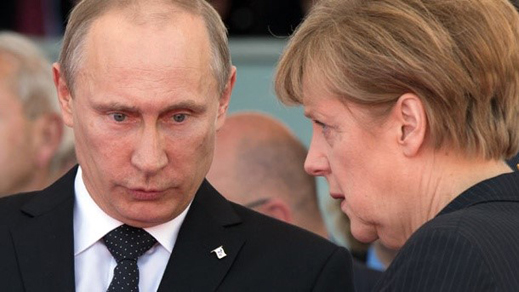
According to the same version of the Brisbane meeting, “Merkel had asked her closest advisers to stay outside during the Brisbane meeting, on November 15 last year. ‘She wanted to be alone. . . to test whether she could get Putin to be more open about what he really wants. But he wouldn’t say what his strategy is, because he doesn’t know.’”
Merkel’s aides make it appear the chancellor is in several minds, then and now. Either she is shocked in disagreement with what Putin says is his strategy; or she is she shocked that he doesn’t have a strategy; or she is shocked that Putin keeps lying to her. The high-level German source says Merkel holds all three versions, but isn’t shocked by them.
Merkel’s public claim that Putin has been lying to her has a twisted history. It is confirmed by Merkel’s aides. But as they have been reported in the German, US and UK media, on each occasion the leak has referred to a quite different “lie”. The high German source says he doesn’t know what Putin lie Merkel is talking about. In December the New Yorker claimed that Merkel aides identified the “lie” in a telephone-call Putin and Merkel had in May, in relation to the Ukrainian presidential election and the Donbass referenda. Contradicting this is the Der Spiegel report of March 24, 2014, which claims the “lies” preceded the March, and possibly even the February events in Ukraine and Crimea. This version by a German employee of US government radio, in an American think-tank publication, claims the “lies” related to Crimea. In this Financial Times version of the Big Lie, the source of what Merkel believed of Putin came by hearsay from a “senior EU official, who has spoken to the chancellor about the issue. ‘In the process, he has lied to her several times.’ ”
German sources familiar with Merkel’s thinking say her association with Tymoshenko is something of a mystery. Reuters has reported that two days after the coup in Kiev, when Tymoshenko was released from prison by the new government, Merkel “congratulated Yulia Tymoshenko on her release and expressed the certainty that her return to mainstream politics would become one of the main factors in stabilising the situation in Ukraine.” The chancellery’s version is different. Merkel, claimed her spokesman, “welcomed Yulia Tymoshenko to freedom… The offer of further medical treatment remains on the table. Angela Merkel also expressed her conviction that the integrity of the country should be preserved. This is a very important point’, underscored the government spokesperson.”
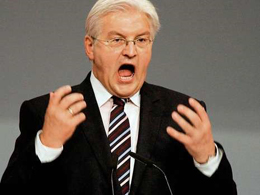 German sources say Merkel supported Tymoshenko’s release from prison and her return to campaign for the vacant presidency — until the US Government decided on an alternative candidate – first, Vitaly Klitschko, then Petro Poroshenko. Conflict between Washington officials and German officials ensued on this point. When Victoria Nuland declared by telephone to US Ambassador Geoffrey Pyatt in Kiev, the month before the coup, “Fuck the EU”, she meant “Fuck the Germans”. Whether Nuland included Merkel with Foreign Minister Frank-Walter Steinmeier (right) in her epithet the German sources aren’t sure. For that story, click.
German sources say Merkel supported Tymoshenko’s release from prison and her return to campaign for the vacant presidency — until the US Government decided on an alternative candidate – first, Vitaly Klitschko, then Petro Poroshenko. Conflict between Washington officials and German officials ensued on this point. When Victoria Nuland declared by telephone to US Ambassador Geoffrey Pyatt in Kiev, the month before the coup, “Fuck the EU”, she meant “Fuck the Germans”. Whether Nuland included Merkel with Foreign Minister Frank-Walter Steinmeier (right) in her epithet the German sources aren’t sure. For that story, click.
There is evidence in Berlin that Merkel was personally much too supportive of Tymoshenko than the Americans wanted. If Reuters is correct in reporting that in her post-prison telephone call Merkel said “Tymoshenko’s return to political life would also contribute to preserving the unity of Ukraine”, the Americans disagreed, strongly.
To the US Government Tymoshenko was, is a corrupt fraudster. The two indictments introduced by US prosecutors in May 2000 and July 2001, charging former Ukrainian Prime Minister Pavel Lazarenko with fraud, money-laundering, and aiding and abetting others in crime identified Tymoshenko as one of Lazarenko’s criminal associates. The second charge sheet says that “beginning in approximately December 1995, a Ukrainian company called United Energy Systems of Ukraine (UESU), which was created on November 20, 1995, by Yulia Tymoshenko, an associate of Lazarenko’s, was designated by the Ukrainian government as one of several companies to supply natural gas to Ukraine.” Tymoshenko then set up an English front company called United Energy international Limited (UEIL), directed by a Turk on her orders, as well as a Cyprus front company called Somolli Enterprises, which the US investigators had found to be “controlled by Tymoshenko and others”.
The Tymoshenko fraud involved diverting Ukrainian state and company payments for imported Gazprom gas to UEIL, as well as to Somolli. The American indictments charge Lazarenko with abetting Tymoshenko’s theft of $140 million. She then kicked back to Lazarenko “more than $120 million” through Switzerland, Antigua, and other havens, with some of the cash reaching Lazarenko’s bank accounts in California.
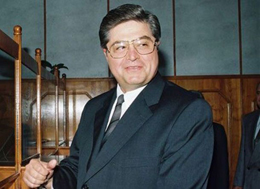 Lazarenko (right) was convicted in 2009, and sent to prison for nine years. Tymoshenko was not prosecuted in the US. The FBI release, issued after Lazarenko’s sentencing, declared: “Yesterday’s sentence should send a strong message to corrupt foreign public officials—they will be held accountable if they misuse their office and try to make safe harbor in the United States… In this age of internationalization, we must diligently pursue corruption wherever it takes hold to help ensure public officials act for the benefit of their constituency, not for their own personal gain.” The FBI omitted to mention Tymoshenko. The US Government decided not to prosecute her. At the time, Tymoshenko was in her third year as prime minister in Kiev.
Lazarenko (right) was convicted in 2009, and sent to prison for nine years. Tymoshenko was not prosecuted in the US. The FBI release, issued after Lazarenko’s sentencing, declared: “Yesterday’s sentence should send a strong message to corrupt foreign public officials—they will be held accountable if they misuse their office and try to make safe harbor in the United States… In this age of internationalization, we must diligently pursue corruption wherever it takes hold to help ensure public officials act for the benefit of their constituency, not for their own personal gain.” The FBI omitted to mention Tymoshenko. The US Government decided not to prosecute her. At the time, Tymoshenko was in her third year as prime minister in Kiev.
Tymoshenko sent $150 million through AmerBank in Warsaw, according to Polish investigations. No Polish prosecution has followed. The Polish president at the time of the gas fraud and money laundering scheme was Alexander Kwasniewski. Subsequently, he became the leading public advocate in Poland for Tymoshenko’s release. For more details, read this.
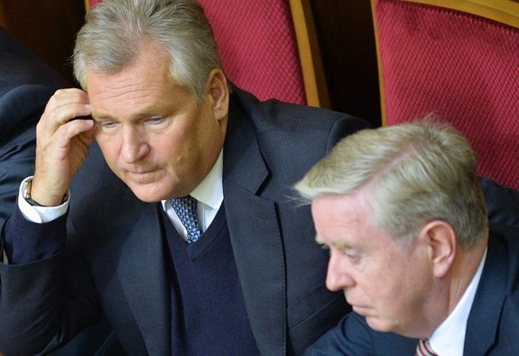
Kwasniweski, with Pat Cox, a former president of the European Commission, in Kharkiv to visit Tymoshenko in a prison hospital on November 22, 2013. They had visited her five months earlier, on June 20, and again on September 4, 2013.
A report in the Kyiv Post in September 2013 revealed the US courts were holding $250 million of Lazarenko’s proceeds, before apportioning them to a variety of claimants. One of them had been an investigator in Massachusetts who claimed 12% of the money it had traced between Tymoshenko and Lazarenko. A US court order, issued in November 2014, did not return the money to Ukraine.
By the time Lazarenko left prison in November 2012, Tymoshenko was in prison in Ukraine, convicted for her part in arranging a Gazprom gas supply contract of 2009. This time there was no mention of diverting Gazprom cash or helping herself to kickbacks. At her trial between June and October 2011 Tymoshenko was accused by Ukrainian state prosecutors of abusing her authority as prime minister during negotiations with Gazprom, and with Putin directly, in January of 2009. In the evidence accepted by the court, she had fabricated documents of the Ukrainian cabinet and had deceived Ukrainian officials whom she obliged to sign a 10-year agreement between Gazprom and Naftogaz. The price of the gas, which Tymoshenko was convicted of concealing from then President Victor Yushchenko and other officials, caused “grave damage” to Ukraine. The quantum of the damage was judged by the court to have been the equivalent of $194.6 million.
Merkel, who had been in office for six years at the time, took several months before publicly attacking Tymoshenko’s imprisonment. Privately, she arranged for a German neurologist to attend Tymoshenko in prison, producing diagnostic reports to warrant her medical evacuation to Germany. Yanukovich refused, suspecting Merkel of fabricating the medical case and preparing to back Tymoshenko for another presidential campaign. By April 2012, when Merkel had failed to extract Tymoshenko, the chancellor went public. German press reports then claimed there was surprise and opposition in Berlin to Merkel’s moves, which included blocking meetings between German and Ukrainian officials, and boycotting the Euro 2012 football tournament scheduled for Ukraine in June of 2012. Der Speigel omitted to report the US evidence of Tymoshenko’s corruption – and how much Merkel knew about it.
It was to counter the German and American-led campaigns for Tymoshenko’s release that Yanukovich then agreed to an engagement by the Ukrainian Ministry of Justice of the US law firm, Skadden Arps Slate Meagher & Flom. In September of 2012 the law firm published its report. Running for 187 pages, plus another 80 pages of translated Ukrainian court documents, Skadden Arps concluded there been no selective prosecution in the case, and that “”we do not believe that Tymoshenko has provided specific evidence of political motivation that would be sufficient to overturn her conviction under American standards.” The full report can be read here.
Skadden Arps also found that “Tymoshenko’s courtroom behaviour would likely have merited a summary contempt finding under western standards.” As for Tymoshenko’s claims against Judge Rodion Kireyev, they “fail to raise significant fairness concerns on the record in this case, and the evidentiary record does not support her claim of personal bias. She has not established that Judge Kireyev’s experience, tenure, or selection violated Western standards of fairness.”
The chief author of the findings against Tymoshenko was Gregory Craig (below, right), a partner at Skadden Arps, and a former White House Counsel for Presidents Barack Obama and Bill Clinton, and director of policy planning at the State Department under Madeleine Albright.
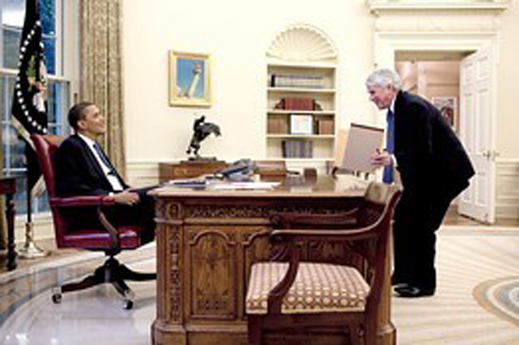 As Craig cleared Yanukovich of Merkel’s charge that Tymoshenko was the victim of “political motivation”, Nuland, then spokesman for the State Department under Hillary Clinton, attacked Craig for the very same: “Our concern is that Skadden Arps lawyers were obviously not going to find political motivation if they weren’t looking for it. Whomever — whoever commissioned this study, whatever the mandate for the study was, it was incomplete and doesn’t give an accurate picture.”
As Craig cleared Yanukovich of Merkel’s charge that Tymoshenko was the victim of “political motivation”, Nuland, then spokesman for the State Department under Hillary Clinton, attacked Craig for the very same: “Our concern is that Skadden Arps lawyers were obviously not going to find political motivation if they weren’t looking for it. Whomever — whoever commissioned this study, whatever the mandate for the study was, it was incomplete and doesn’t give an accurate picture.”
Five days after Yanukovich had been overthrown, evidence of a memorandum Craig had written in August 2012, was reported by the New York Times. Instead of the Craig original, requesting help in obtaining Ukrainian prosecution documents, reporter Andrew Kramer said a Russian translation of the memo had been found among Yanukovich’s papers in the lake at his country mansion. Kramer claimed: “It had been known that the law firm of Skadden, Arps, Slate, Meagher & Flom had compiled a largely sympathetic report in 2012 on the government’s prosecution of Ms. Tymoshenko, even though most impartial observers say it was politically motivated.” Kramer didn’t identify or quote an impartial observer. He was unaware the report had been released eighteen months earlier.
In December 2012 two other New York Times reporters had published excerpts. In the headline and lead they claimed the Skadden Arps report had concluded that “important legal rights of the jailed former prime minister, Yulia V. Tymoshenko, were violated during her trial last year on charges of abusing her official power, and that she was wrongly imprisoned even before her conviction and sentencing. The lawyers, led by President Obama’s former White House counsel, Gregory B. Craig, concluded that Ms. Tymoshenko was denied legal counsel at “critical stages” of her trial and that at other times her lawyers were wrongly barred from calling relevant witnesses. Those two findings suggest that she could have some success in a pending appeal before the European Court of Human Rights.”
On April 30, 2013, the European Court ruled that Tymoshenko’s pre-trial detention had been “arbitrary”, and that before she was convicted and sentenced, the jailing “had not been properly reviewed”. The court avoided reaching any judgement of the trial, conviction, sentence, or the Ukrainian appeal.
Last month the European Court released a ruling that it had struck out the case Tymoshenko had filed in August 2011, before her conviction was issued and her imprisonment confirmed on appeal. The 7-judge panel ruled on December 16. The press release which followed a fortnight ago, reveals that on May 7, 2014 the new Ukrainian Government “informed the Court that they proposed to make a declaration with a view to resolving the issues raised by the application. The Government admitted that the criminal prosecution against Ms Tymoshenko had been politically motivated and acknowledged a violation of her rights guaranteed by Articles 3, 6, 7, 8 and 13 in connection with Article 8 of the Convention, Article 18 in connection with Articles 6, 8 and 10 of the Convention, and Article 4 of Protocol No. 7.”
Two of the judges casting votes, Angelika Nussberger (below, left) and Ganna Yudkivska (right), are from Germany and Ukraine. Nussberger, who won her seat by a narrow majority of European Assembly votes in 2010, reports herself to be an expert on constitutional law in Russia and Ukraine. Yudkivska was nominated for her seat when Tymoshenko was prime minister.
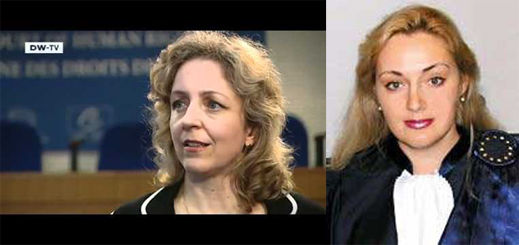
The judges did not test evidence for the political motivation claim, nor of the motivation by which the political replacements of the Yanukovich regime, including Tymoshenko, had decided to settle the case within weeks of taking power, before an election had confirmed either president or prime minister. There was also no judicial finding on the allegations Tymoshenko had made in her submission, which have been dismissed for lack of evidence in the Skadden Arps report.
“The Court took note of Ms Tymoshenko’s agreement to the terms of the declaration made by the Government and found that her agreement could be considered as an implied friendly settlement between the parties. The Court therefore found no reason to continue its examination of the applications and decided to strike it out of its list of cases pursuant to Article 39 of the Convention (friendly settlements).”
Support for Tymoshenko has been disappearing in Ukraine. In the 2010 presidential election, she gained 45.5%, losing narrowly to Yanukovich with 49%. In the May 26, 2014, presidential election Tymoshenko polled 12.8% of the vote, running a distant second to Poroshenko’s 54.7%. In the October 26 election to the Verkhovna Rada, her Batkivshchyna (“Fatherland”) party was in 6th place, drawing 5.7% of the votes.
Merkel has never been asked to address publicly the corruption evidence against Tymoshenko compiled by the US government. Nor has she claimed Tymoshenko is innocent of the Ukrainian charges on which she was convicted by the Ukrainian court; only that the Ukrainian prosecution was politically motivated. A London lawyer practising at the European Court of Human Rights says: “Of course, the American decision not to prosecute Tymoshenko is politically motivated. So is the decision of the European Court of Human Rights not to proceed with a test of political motivation in the Tymoshenko case. So are the prosecutions Poroshenko and Yatseniuk have launched against a slew of their predecessors. What, if not political motivation, is driving the US and UK sanctions lists?”
German officials in Berlin, according to a German source advising them, say a military showdown between Russia and NATO isn’t likely; that Putin is bluffing; that his military forces are incapable. “Putin had his chance to bluff,” the source says, “but that was months ago. He didn’t have what it takes. So the German cycle with Russia is repeating itself; only Merkel has speeded it up. [Chancellor, then Foreign Minister Gustav] Stresemann in the 1920s to Hitler in the 1940s, from business to war. Merkel and the Germans are Russia-haters now. Let’s see who is bluffing.”


Kudos to the Ukrainian people for overwhelmingly rejecting Tymoshenko. And not only in the elections, where one could argue American influence played a part. IIRC, the ‘man-on-the-street’ interviews in Ukraine during the tepid enthusiasm immediately upon Tymoshenko’s release were consistent in that, while it was nice she was released, she should definitely not be part of the future.
(And some kudos to the oft-vilified Nuland and State Department here too.)
Only low hanging fruit is prosecuted by The U.S. Governments Department of InJustice. If you’re connected, like a TBTF or fellow connected Pol, you can commit massive fraud, launder money for drug cartels, sell guns to drug cartels, illegally foreclose on Americans homes, no problem. At least the lack of a rule of law isn’t restricted to The U.S., because you know, were all in this together.
See the Exceptionalism clause.
For whatever reason or reasons the ugly fact of the matter is that Obama and Merkel have a visceral hatred of Putin and it is driving policy right now. My wife forced me to listen to an NPR interview with Obama around New Years and the man could not hide the glee he felt at the collapsing Russian economy and the part he had played in sabotaging what little prosperity Russia had. The world is run today by petty, petulant second-raters. The parallels to 1914 are growing.
What’s most depressing of all are the utter nullities (Obama, Cameron, Merkel, Holland, etc.) who are making these dangerous decisions.
“Petulant.” I’m glad that you wrote the adjective. There is a side of Obama that is overtly petulant in that pissy professorial way. It’s a reminder that he is a lightweight.
Putin’s chief sin was simultaneously embarrassing Obama and saving Obama from larger disaster in October 2013 over Syria. Obama and his cultists can’t forgive how Obama was exposed. Here in the U.S. dissent is shouted down or comes from GOP sources and can be overlooked.
American exceptionalism was also attacked, so Putin has to become public enemy #1.
If there is a full-scale war with Russia I predict it will be the fiery end of the religion of ‘American Exceptionalism’. Here’s what will happen: Russian AA systems will quickly sweep the skies of all American planes, including any ‘stealth’ planes we deploy. Anything not shot-down by SAMs will be outmaneuvered and picked off by Sukhoi’s and MiG’s. Next they’ll send in the Su-25s and 34s to shred our ground forces, followed closely by dedicated attack helicopters and heavily armed helicopter infantry transports (which the US has no counterpart to). All the while they’ll be bombarding our positions will MLRS’s in classic Russian style. At some point a massive armor push will be employed to crush whatever the Frontal Aviation and artillery have left alive. Of course this will all be done under an umbrella of jamming which the US may or may not be able to effectively counter. What we won’t be able to counter is their ability to completely shutdown our ships, including our vaunted AEGIS cruisers, which means any fleet we deploy will be out of action if it doesn’t have air cover, which it won’t.
Assuming things don’t go nuclear and the war drags on long enough I think American *could* eventually win simply because we have so much more hardware, but the Russians would bleed us heavily before that moment came. The civilian part of Washington may think war is a desirable policy, but the Pentagon is much less gung-ho about the idea. Russia, even in a declined state, is a much more fearsome prospect than the poorly equipped, badly motivated Iraqi army ever was.
It sounds like you are positing US/NATO forces actually getting into an honest-to-God shooting war with Russia on a Eurasian battlefield. If that were to ever really happen, Jack, then your scenario is MUCH too optimistic regarding what would happen to the US military.
In such an ultimate showdown, China would almost certainly weigh in on Russia’s side. Even if they didn’t commit major assets to the actual theater, their killer satellites would take out the majority of Western satellites. No more GPS — there goes the vaunted high-tech precision weapons that the US relies on as a vital force multiplier.
Of course, as you say, that would be meaningless since the Western air forces would be swept from the skies regardless. Since the American way of war for decades (since Vietnam) has been to merely have the infantry blunder into contact with the enemy and then sit and howl for artillery and air strikes, this would present an insurmountable problem: no planes on call, and (as you also noted) Russian artillery vastly outclasses its Western counterparts.
As the scenario further unfolds, that leaves NATO armor and infantry to battle on alone. What the Novorussian soldiers are doing to the poor Ukrainian sods is what the Russian soldiers will eventually do to NATO. The fighting will be much more prolonged and bloody, but there is no doubt about the end result: unlike in 1945, this time the Russians may choose to pass over the Elbe and roll all the way to Lisbon.
There certainly won’t be anything short of the nuclear devastation of Europe by the US to stop them. Of course, if the neo-con cretins are insane enough to actually launch a strategic nuclear attack on Russia, their doomsday bunkers won’t be deep enough to save them (along with the rest of mankind) from the annihilating Russian counterstrike.
If McCain and his fellow lunatics ever actually order the US military to go to war with Russia, then we can only hope that the lesser of evils occurs: the generals in the Pentagon conduct a swift coup and arrest all the civilian assholes giving such insane orders.
We can deal with the aftermath once the immediate crisis has passed. Life under a military dictatorship may (or may not) be problematic — but at least we’ll all be alive to find out….
While there are things I don’t care for about Putin and the government he heads I will say this for him – he actually lives in reality. The North American and European elites seem completely delusional in comparison. In the near future I can see the U.S. and the EU throwing away a lot of money and sending military trainers to the Kiev government but I doubt Putin is wetting his pants in fear over that prospect given the success of the same strategy in Afghanistan and Iraq. A lot more people in the Ukraine will die, the economy there will go down the tubes but I suspect the Crimea will remain part of Russia, the rebel areas will get some sort of autonomy and lots of terrible people will be rolling in money from selling weapons and looting the corpse of the Ukraine. Assuming we have enough of a civilization a couple of centuries from now to research history I think that the half century after WWII will be seen as the age when military power completely lost any ability to resolve political differences. I will also venture the prediction that if the EU doesn’t negotiate a settlement with Greece that the Greek people find fair it will lead to the end of the EU.
It’s pretty easy to get a perspective of just how crazy, reckless and irresponsible the leaders of the U.S. and EU are when people like Kissenger and Pat Buchanan, people who have no qualms about calling for dealing death and destruction if they think there is some advantage in doing so, are flat out calling those pursuing the current course in the Ukraine reckless and irresponsible.
That’s not fair to Pat Buchanan. He’s been consistently anti-war for many years. He’s questioned America’s subservience to Israel. Plus he came out against globalization 25 years ago. He is not a tool of the 1% the way Kissinger is.
RMO utterly backward in condemning Buchanan and Kissinger in same breath. Pat B has been consistently anti-war ever since Vietnam. His “Endless War” article in American Conservative took the Neocons apart and made a case for stopping our longtime policy of “destabilizing,” invading, isolating whatever/whomever we didn’t like (at the moment, viz Hussein, Bin Laden, Mubarak, etc., 1st buddies, then enemies). Views he expresses on Ukraine/Russia/ EU Follies are also rock-solid realistic. His ongoing logic and actual patriotism has been unwavering. And he’s one of the punchiest, sharp-eyed and convincing pundits we have commenting on the Empire Follies.
I’m assuming the end goal for the Beltway is a hot war. Everything going on right now is an attempt to bait Russia into openly sending forces into Ukraine, at which point NATO will ‘have’ to respond to the ‘aggression’. The goal is to take Russia down a peg now, rather than try in ten years when they’re much more secure and prepared. Our leadership is filled will MIC marketing visions of high-tech wiz-bang gadgets, and grossly overestimates the capability of the US military. Not unlike the Georgians seem to have done in 2008 with all their fancy Israeli gear.
As for a US military coup, I don’t see that ever happening. Maybe my impression is wrong but it seems to me that our military is (more or less) completely subservient to the civilian leadership. Though there are many (a scary amount in fact) similarities between modern America and the Late Roman Republic, a largely independent military made up of charismatic generals full of personal ambition doesn’t seem to be one of them. The military will do what it’s told, though the Pentagon will doubtless grumble a lot.
Correction: The *Pentagon* will do what it’s told. Generals (the “perfumed princes” as Col. David Hackworth contemptuously called the REMF desk-jockey bureaucrats ) have a vested interest in maintaining the status quo — and their perks at the top of the food chain. There’s a reason why coups are usually led by colonels.
Or, as a Marine officer of my acquaintance put it a coupla years ago when we were discussing this topic: “Lower ranks aren’t trained to think; they’re trained to obey orders. Officers, however, ARE trained to think.”
Interestingly enough, at the time he was a major well on track to becoming a lt. col…..
The end goal is driving Russia out of the arms and energy industry. The NSA fallout has been huge. Former American outlets are moving to Russian and Chinese weapons and tech.
NATO is a captured market. Even the sanctions against Russia were designed to hit the French arms industry, another competitor.
In your scenario I do not see how nuclear war can be avoided. If those running NATO can be so irresponsible to start such a war then the Russians must assume they can be even more irresponsible as to launch a first strike if they are losing the war conventionally. There’s a natural process of escalation which makes using nukes unavoidable. Plus the one who strikes first has the advantage, therefore it’s crucial for both sides to make sure they launch that first strike.
Luckily NATO has a track record of a bully and a bully only picks on someone who can’t fight back(Yugoslavia, Afghanistan, Libya…). Based on that one must assume NATO is bluffing and simply using Russia and Putin to create more fear domestically. Granted there are numerous players in NATO decision making and it could go beyond bluff to saving face. Still we must hope it’s just hubris because the Russians are in a corner and Putin will eventually have no choice but to fight. Plus the Chinese will have no choice but to support him.
I still think the best hope for peace is economic collapse in the West, the sooner the better. Some claim China/Russia could collapse the US dollar any time they like but don’t wish to make the first move and provoke a backlash. I do hope that if things do threaten to get much worse militarily that Asia will counter attack economically and that won’t lead to WW3.
“Assuming things don’t go nuclear” is irreal. Of course they will go nuclear. Where else could they go? And Obama is just the man to take it there.
If Obama’s staffers are reading this, please pass this message along to Mister President.
“Think, Obama! Think! If you turn the earth’s surface into an ionized plasma cloud, how will you live to spend all the money you count on being paid after leaving office?
The money, Obama! Think of all the beautiful money!”
I love the lead-in about Merkel’s view of Putin and his “Chekist” regime in Russia. I’m just scratching my head trying to figure out the difference between a government captured by the KGB/FSB and a government captured by the Carlyle Group and their tools the Bushes, the Clintons, and the neo-liberal Harvard/Yale/Princeton/Chicago/Stanford/Brown/Dartmouth axis.
An above-the-law National Security State looting an economy is the road to serfdom in any language.
What does Brown have to do with this? Last time I checked, they certainly were not fielding any econ headliners.
Brown is the ultra-tony undergraduate school these days.
Serfdom? Would that we should be so lucky to oblige our lords to anything not involving their own navels.
I lived under a KGB government and if you think that living under Carlyle group is the same, you are truly out of your mind.
I most certainly do not intend a direct comparison of quality of life under the KGB/FSB regime — rather my point is that once you adopt the ideology of an above-the-law National Security State, it is the same road to serfdom. Of course, Russians are far better-versed in serfdom than are Americans — however, Americans are rapidly catching-up!
I was always mystified by Merkel’s (and by extension the EU’s) support for the Lady of the Braids. What Helmer does not say, it that (afaik from reading etc.) the liberation of Yulia was a condition for the signing of the European Association Agreement. And she was actually freed (again, afaik) before the deadly day of snipers in the Maidan, perhaps just a few hours before. These are details one could look up, I might be wrong. Water under the bridge by now, but still.
Helmer’s piece clarifies somewhat, but not the love beween these two ladies, nor Merkel’s perpetual championing of the boxer Klitschko, which failed, though he did become mayor of Kiev (not a big role) and is now in deep trouble.
just a thought: the Leviathan oil/gas field off Israel (Gaza) was supposedly discovered in 2010. for any satellite of Russia it was interesting news. As well as competitors and consumers: Saudi Arabia and the EU. Tymoshenko would have had info on all this since it is critical to the EU and Ukraine was so well positioned… and messing with gazprom, etc. is just messing with conracts; no big deal – hey it’s just business. Who stood to benefit from this new discovery? the EU. I bet Leviathan was discovered just in time for Mitt Romney to advocate war with Russia in 2012. Out of the blue for most of us. The big and very annoying question is: Is it worth going to war for? And then also it would be nice to know who actually has a legitimate claim to these resources.
Tymoshenko and the invention of tradition are a momentarily interesting sideshow–the braids of the young peasant woman, the embroidered bodice. She probably wears wooden shoes. Considering the frauds in U.S. politics, she knows the territory well. And like U.S. “nuculur” politicians, she can grab with the best of those grifters.
As to Merkel, maybe the DDR was more formative than we’d like to think. It takes much of a lifetime to learn to have a democratic (small d) temperament.
Merkel is deceptively weak. Her election and reelection campaigns were largely due to a wishy washy left and single women voting for her allies. Her party knows many of their votes won’t materialize in the next election without the parliamentary equivalent of Merkel being on the ballot. They probably aren’t in open rebellion, but my guess is Merkel doesn’t have the support in Berlin her counterparts have among their relevant parties.
She probably doesn’t have the standing to rock the boat without making her party members nervous.